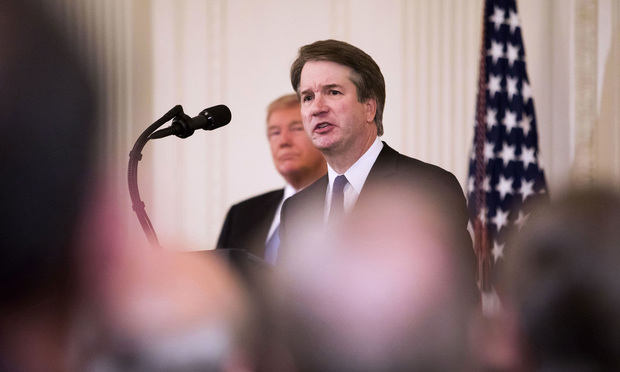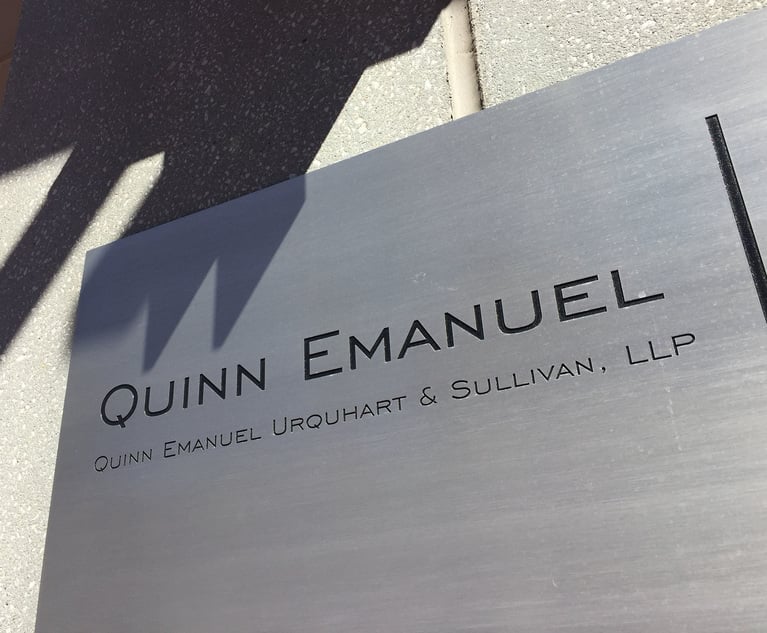Kavanaugh Leads Majority Ruling for Mississippi Death Row Inmate
"The state used its available peremptory strikes to attempt to strike every single black prospective juror that it could have struck," Kavanaugh wrote.
June 21, 2019 at 11:07 AM
4 minute read
 Judge Brett Kavanaugh speaks in the East Room of the White House after President Donald Trump nominated him to the U.S. Supreme Court. July 9, 2018. Photo by Diego Radzsinchi/ALM
Judge Brett Kavanaugh speaks in the East Room of the White House after President Donald Trump nominated him to the U.S. Supreme Court. July 9, 2018. Photo by Diego Radzsinchi/ALM
Updated 12:20 p.m.
The U.S. Supreme Court, with a searing dissent by Justice Clarence Thomas, overturned a Mississippi death row inmate's sentence because of racially biased juror strikes by the prosecution.
The high court, in an opinion from Justice Brett Kavanaugh, ruled 7-2 that the judge in Curtis Flowers' sixth trial for the murder of four furniture store employees in 1996 wrongly applied the Supreme Court's 1986 decision, Batson v. Kentucky. That decision said that a state may not discriminate on the basis of race when exercising peremptory challenges against prospective jurors in a criminal trial.
Flowers, who is black, was tried each time by the same prosecutor.
“[O]ur review of the history of the prosecutor's peremptory strikes in Flowers' first four trials strongly supports the conclusion that his use of peremptory strikes in Flowers' sixth trial was motivated in substantial part by discriminatory intent,” Kavanaugh wrote.
He added: “The numbers speak loudly. Over the course of the first four trials, there were 36 black prospective jurors against whom the state could have exercised a peremptory strike. The state tried to strike all 36. The state used its available peremptory strikes to attempt to strike every single black prospective juror that it could have struck.”
Justice Samuel Alito Jr., concurring in the opinion, called the case “highly unusual” and “likely one of a kind.” Based on the “totality of the circumstances,” Alito, generally a pro-government vote, wrote, “I agree with the court that petitioner's capital conviction cannot stand.”
Thomas, joined in part by Justice Neil Gorsuch, offered a dramatically different view of the case in his 41-page dissenting opinion.
“If the court's opinion today has a redeeming quality, it is this: The state is perfectly free to convict Curtis Flowers again,” Thomas wrote. “Otherwise, the opinion distorts our legal standards, ignores the record, and reflects utter disrespect for the careful analysis of the Mississippi courts. Any competent prosecutor would have exercised the same strikes as the State did in this trial. And although the court's opinion might boost its self-esteem, it also needlessly prolongs the suffering of four victims' families.”
Thomas said the “more fundamental problem” is the Batson decision itself. Quoting from his previous opinions involving Batson, Thomas added, “The 'entire line of cases following Batson' is 'a misguided effort to remedy a general societal wrong by using the Constitution to regulate the traditionally discretionary exercise of peremptory challenges.'”
Gorsuch did not join the portion of the dissent in which Thomas called into question the correctness of Batson and its progeny.
At the oral argument, Kavanaugh played a lead role in raising questions about the jury selection in Flowers' case. Kavanaugh, at his confirmation hearing in 2006 to the U.S. Court of Appeals for the D.C. Circuit, said: “I think one of the great Supreme Court decisions ever decided was Batson v. Kentucky.”
Sherrilyn Ifill, president and director-counsel at the NAACP Legal Defense and Educational Fund, said in a statement: “Racial discrimination in jury selection almost cost Curtis Flowers his life, but the Court's ruling vindicates the principle that racial bias must not be permitted to infect the criminal justice system.”
She continued: “Mississippi's Fifth Judicial District has a long, disturbing history of denying Black people the right to serve on and be judged by a fair jury. As today's opinion indicates, these rights are just as integral to full participation in our democracy as the right to vote, and they must be protected just as vigorously.”
The court's ruling in Flowers v. Mississippi is posted below:
Read more:
Kavanaugh Takes Lead Role Favoring Mississippi Death Row Inmate
Public Safety Depends on Juries Chosen Without Racial Discrimination
Chief Justice Roberts Joins Liberal Wing to Snub Alabama Court in Death Case
This story was updated with comment about the Supreme Court's ruling.
This content has been archived. It is available through our partners, LexisNexis® and Bloomberg Law.
To view this content, please continue to their sites.
Not a Lexis Subscriber?
Subscribe Now
Not a Bloomberg Law Subscriber?
Subscribe Now
NOT FOR REPRINT
© 2025 ALM Global, LLC, All Rights Reserved. Request academic re-use from www.copyright.com. All other uses, submit a request to [email protected]. For more information visit Asset & Logo Licensing.
You Might Like
View All
Private Equity Giant KKR Refiles SDNY Countersuit in DOJ Premerger Filing Row
3 minute read
Skadden and Steptoe, Defending Amex GBT, Blasts Biden DOJ's Antitrust Lawsuit Over Merger Proposal
4 minute read
Quinn Emanuel Files Countersuit Against DOJ in Row Over Premerger Reporting
3 minute read
Read the Document: DOJ Releases Ex-Special Counsel's Report Explaining Trump Prosecutions
3 minute readTrending Stories
- 1How ‘Bilateral Tapping’ Can Help with Stress and Anxiety
- 2How Law Firms Can Make Business Services a Performance Champion
- 3'Digital Mindset': Hogan Lovells' New Global Managing Partner for Digitalization
- 4Silk Road Founder Ross Ulbricht Has New York Sentence Pardoned by Trump
- 5Settlement Allows Spouses of U.S. Citizens to Reopen Removal Proceedings
Who Got The Work
J. Brugh Lower of Gibbons has entered an appearance for industrial equipment supplier Devco Corporation in a pending trademark infringement lawsuit. The suit, accusing the defendant of selling knock-off Graco products, was filed Dec. 18 in New Jersey District Court by Rivkin Radler on behalf of Graco Inc. and Graco Minnesota. The case, assigned to U.S. District Judge Zahid N. Quraishi, is 3:24-cv-11294, Graco Inc. et al v. Devco Corporation.
Who Got The Work
Rebecca Maller-Stein and Kent A. Yalowitz of Arnold & Porter Kaye Scholer have entered their appearances for Hanaco Venture Capital and its executives, Lior Prosor and David Frankel, in a pending securities lawsuit. The action, filed on Dec. 24 in New York Southern District Court by Zell, Aron & Co. on behalf of Goldeneye Advisors, accuses the defendants of negligently and fraudulently managing the plaintiff's $1 million investment. The case, assigned to U.S. District Judge Vernon S. Broderick, is 1:24-cv-09918, Goldeneye Advisors, LLC v. Hanaco Venture Capital, Ltd. et al.
Who Got The Work
Attorneys from A&O Shearman has stepped in as defense counsel for Toronto-Dominion Bank and other defendants in a pending securities class action. The suit, filed Dec. 11 in New York Southern District Court by Bleichmar Fonti & Auld, accuses the defendants of concealing the bank's 'pervasive' deficiencies in regards to its compliance with the Bank Secrecy Act and the quality of its anti-money laundering controls. The case, assigned to U.S. District Judge Arun Subramanian, is 1:24-cv-09445, Gonzalez v. The Toronto-Dominion Bank et al.
Who Got The Work
Crown Castle International, a Pennsylvania company providing shared communications infrastructure, has turned to Luke D. Wolf of Gordon Rees Scully Mansukhani to fend off a pending breach-of-contract lawsuit. The court action, filed Nov. 25 in Michigan Eastern District Court by Hooper Hathaway PC on behalf of The Town Residences LLC, accuses Crown Castle of failing to transfer approximately $30,000 in utility payments from T-Mobile in breach of a roof-top lease and assignment agreement. The case, assigned to U.S. District Judge Susan K. Declercq, is 2:24-cv-13131, The Town Residences LLC v. T-Mobile US, Inc. et al.
Who Got The Work
Wilfred P. Coronato and Daniel M. Schwartz of McCarter & English have stepped in as defense counsel to Electrolux Home Products Inc. in a pending product liability lawsuit. The court action, filed Nov. 26 in New York Eastern District Court by Poulos Lopiccolo PC and Nagel Rice LLP on behalf of David Stern, alleges that the defendant's refrigerators’ drawers and shelving repeatedly break and fall apart within months after purchase. The case, assigned to U.S. District Judge Joan M. Azrack, is 2:24-cv-08204, Stern v. Electrolux Home Products, Inc.
Featured Firms
Law Offices of Gary Martin Hays & Associates, P.C.
(470) 294-1674
Law Offices of Mark E. Salomone
(857) 444-6468
Smith & Hassler
(713) 739-1250










